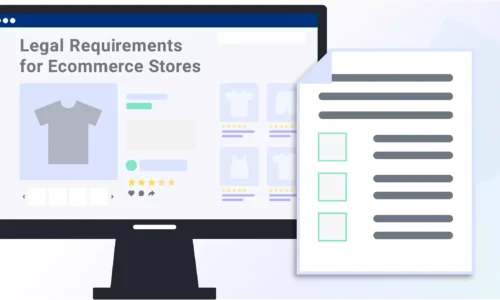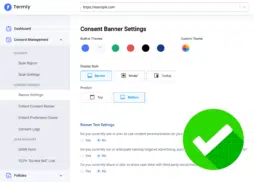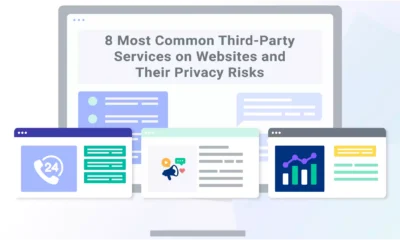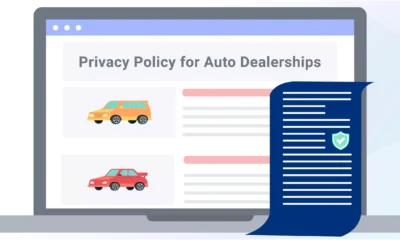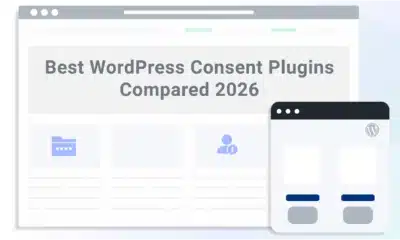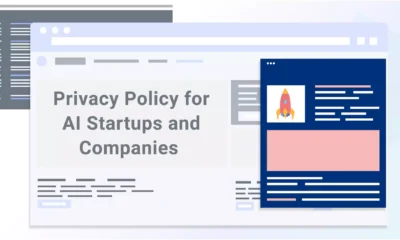Ecommerce stores are impacted by various types of laws, from data privacy laws to consumer protection regulations and more.
Below, I’ve summarized a list of some significant laws that affect ecommerce websites and included a basic checklist of the requirements, so you can ensure your store has all the right policies and more to stay on the right side of the law.
Overview of Legal Requirements for Ecommerce Stores
Below is a table quickly summarizing various laws that might impact ecommerce stores and some of the legal requirements they outline.
|
Law |
Impact on Ecommerce Stores |
Example of Legal Requirements |
|
Data Privacy Laws |
Ecommerce stores that collect, process, and use personal data may fall under data privacy laws. |
|
|
Consumer Protection Laws |
Because ecommerce stores sell products to consumers, they’re subject to following their countries’ consumer protection laws. |
|
|
Accessibility Laws and Digital Inclusivity |
Websites need to be made accessible to all users, so anyone can access, read, and use the platform, including those with handicaps. |
|
|
Child Protection Laws |
Children are protected by laws around the globe, and if they end up on your website, even by accident, you need to have a plan in place for following these laws. |
|
|
Industry-Specific Laws |
Some industries are more regulated than others.
For example, those in the medical field need to follow specific medical laws, like HIPPAA. Those in the financial sector need to consider laws like the GLBA. |
|
Laws That Impact Ecommerce Stores
It’s important to know which laws impact your ecommerce store, so you can ensure you align your site with all applicable legal requirements.
This helps keep your store out of trouble, otherwise you might face potential violations such as fines, criminal charges, and damage to your brand’s reputation.
1. Data Privacy Laws
Most ecommerce stores collect, process, and user personal information from website visitors and need to consider data privacy laws, including:
- GDPR
- CCPA
- CPA
- VCDPA
- Brazil’s LGPD
- South Africa’s POPIA
These laws apply based on factors like:
- Where your site visitors are located,
- Where your business is located,
- How much personal information you collect,
- The type of personal information you collect,
- If you sell or share the data,
- If you use the data for targeted advertising or direct marketing,
- Monetary and other threshold factors.
Ecommerce Stores Requirements Checklist
While each privacy law is different, here’s a quick summary of the basic requirements common to legal frameworks:
- Present website visitors with a transparent, updated privacy policy,
- Present website visitors with a clear link to a cookie policy,
- Request proper consent for cookies or other trackers using a consent banner,
- Provide a way for website visitors to easily change their minds at any time,
- Properly respond to user requests to follow through on their privacy rights.
2. Consumer Protection Laws
Consumer protection laws heavily regulate how ecommerce stores interact with and respond to their customers.
These laws, and the groups that enforce them, typically create the guidelines for what is considered fair and just trade between businesses and consumers.
Ecommerce Stores Requirements Checklist
While the consumer protection guidelines vary from one country to the next, here’s a list of some example requirements and expectations:
- Only post accurate reviews for products that are honest and about goods or services the poster actually used,
- Clearly label and mark all ads on all platforms, including social media posts or in YouTube videos,
- Express the copyrights you’re retaining over your content and materials in a disclaimer or clause in your terms and conditions agreement,
- Include a DMCA notice in your terms and conditions agreement.
3. Accessibility Laws and Digital Inclusivity
Your website is likely impacted by accessibility laws, for example:
- Americans with Disabilities Act (ADA)
- European Accessibility Act (EAA)
These laws apply based on factors like:
- Where your business is located,
- The industry you work in.
Ecommerce Stores Requirements Checklist
The standards for your ecommerce store will change depending on the type of standards you’re attempting to reach and the level within the standard you want to attain.
For example, WCAG standards are different than ATAG and UAAG standards, etc.
However, you’ll likely need to focus on or implement the following features:
- Automated scanners
- Contrast checkers
- Keyboard navigation tools
- Captioning and multimedia tools
4. Child Protection Laws
Even if your ecommerce store doesn’t directly target children, your website is still technically impacted by child protection laws.
- Children’s Online Privacy Protection Act (COPPA)
- Digital Services Act (DSA)
Ecommerce Stores Requirements Checklist
If your ecommerce store doesn’t purposefully target minors, you’ll still need to implement the following guidelines:
- Explain in a clause in your privacy policy that you do not collect data about known minors or children,
- Explain in your privacy policy how legal guardians can contact you if they believe you accidentally collected data about their child,
- Have a way to delete any data accidentally collected about a child.
If your store targets children and minors, there are extremely specific guidelines you’ll have to follow, and you should consider consulting a lawyer for assistance.
5. Industry-Specific Laws
If your ecommerce store is in a specific industry, there may be even more laws you need to follow and requirements you’ll need to meet.
For example, this is the case with those in the medical field, financial industry, education, or who have nonprofit status.
This means your store could be impacted by the following industry-specific laws:
- Gramm-Leach Bliley Act (GLBA)
- Health Insurance Portability and Accountability Act (HIPAA)
Ecommerce Stores Requirements Checklist
The industry specific requirements that impact ecommerce stores can be very diverse, depending on the type of business you work in.
That said, these laws typically impact:
- The contents of your privacy policy and how you collect and handle data,
- The disclaimers you post on your site and where they are posted.
Required Legal Policies
Now that I’ve covered the various kinds of laws that often impact ecommerce stores, let’s discuss the different legal policies you should add to your website.
Privacy Policy
Your ecommerce store should post a privacy policy in the footer of your site and present it to users wherever any data collection occurs.
Why?
A privacy policy is a legally required document that should be posted on all websites.
Plenty of recent data privacy statistics emphasize that that modern consumers care about their privacy online and being honest about the personal information you collect from your users and what you do with that data is the right thing to do.
Your privacy should include the following details:
- What personal data you collect
- Why you collect the data
- If you share or sell it to others
- How consumers can follow through on their privacy rights
If you fall under specific data privacy laws, you’ll need to add additional information to your policy in order to meet the transparency and notification requirements.
How To Make One
Your ecommerce store can make a privacy policy by writing it yourself, using a template, or using a managed solution like Termly’s Privacy Policy Generator.
Cookie Policy & Consent Management
Almost as important as a privacy policy is your ecommerce store’s cookie policy and consent management solutions.
Why?
Cookie and other tracking technologies collect personal data from website visitors, and they can come from anywhere in the world, meaning they might be in Europe and protected by the GDPR, or they could be in California, protected by the CCPA.
You should have an accurate cookie policy posted in the footer of your ecommerce store website that accurately categorizes all cookies your site uses and explains their purpose.
Link this cookie policy to a pop-up consent banner and request appropriate opt-in or opt-out consent, as dependent on which laws impact you and your consumers.
How To Make One
While you can write your own cookie policy or attempt to create your own consent tools, this is not recommended. Instead, consider using a managed solution, like Termly’s consent management platform.
This way, all the tricky technical aspects of consent management are taking care of for you, leaving your business with less to worry about.
Terms and Conditions Agreement
Your ecommerce store should have a terms and conditions agreement (also called a terms of use or terms of service).
These are important agreements between your business and your website users.
Why?
Even though this policy isn’t legally required, it can provide legal protection for your business should a dispute ever occur. It can also help you more easily align your site with applicable laws, especially if you’re required to provide your users with any disclaimers.
It sets the groundwork for what you expect from them when using your platform and what they can expect from you in return.
You can also outline important details about your business, like your dispute resolutions, governing laws, rules of use, and payment terms.
How To Make One
To make one of these agreements, you can use a free template or try writing it yourself. The easiest way, though, is to use a managed solution, like Termly’s Terms and Conditions Generator.
It asks basic questions about your ecommerce store then makes a unique, custom policy for you based entirely on your answers.
Acceptable Use Policy
Related to your terms and conditions agreement is an acceptable use policy (AUP), which explains all rules and expectations users must follow to use your website, including what’s not allowed, rules for account termination, and more.
Why?
This type of policy is often necessary for ecommerce stores that also allow their users to interact as some type of community or allow people to post their own content.
For example, think about services like the Community tab on YouTube, the comments section available to users of services like America’s Test Kitchen, or games where users can interact via a headset and access a game shop.
An AUP allows you to outline more nuances, specific rules related to your specific type of community to prevent abusive users from taking advantage of your services and the peace, privacy, and wellbeing of other users.
How To Make One
This policy can be linked to a clause in your terms and conditions agreement but shared in full in a separate document.
The easiest way to make one is to use a managed solution like Termly’s Acceptable Use Policy Generator, which can be linked directly to your Terms and Conditions if you also use our T&C Generator.
You can also try writing one yourself, but starting with a free acceptable use policy template may help you save time.
Disclaimers
Most ecommerce stores need to post some type of disclaimer either in the footer of their site, on a specific page, or presented in some way that’s easily available to users.
Why?
Your ecommerce store might need to post specific disclaimers in various locations, which may be required by law or used to protect your business.
For example, if you post any sponsored links, you might need to post ad disclosures. If you publish customer testimonials on your site, you may need a testimonials disclaimer.
An advice disclaimer may be required for ecommerce stores that are in the health, fitness, and wellness industry.
Similarly, copyright disclaimers are often necessary for content creators who sell merch or artists and prints of their work. The list can literally go on and on.
How To Make One
There are a few valid ways to make disclaimers for your site.
Some are simple and you can make them immediately on your own. For example, a copyright disclaimer is just the name of your brand, the year, and a copyright symbol.
Others take more work and nuance, especially if you require multiple disclaimers.
Using a free disclaimer template can help, but the fastest way to make these is to use a disclaimer generator.
Return and Shipping Policies
If your store sells physical goods to consumers, a shipping policy keeps them informed about what to expect before they place an order.
A return and refund policy helps ecommerce stores that sell digital or physical products, as it outlines when and why consumers can return products and what to expect for a refund, if any is available.
Why?
These policies are not always legally required; however, there are consumer laws that outline requirements that obligate businesses to accept returns within specific time limits.
This is the case in the UK, where the consumer does not even need to provide a reason for the return.
Ecommerce stores can also benefit from posting these policies on their websites because it efficiently helps new and returning customers answer common customer service questions on their own.
They can learn about shipping times, available options, and more in a few seconds, which may help them feel more reassured to make a purchase from your site.
How To Make One
These documents are complex to make because they often involve a lot of specific, unique details, especially if your ecommerce store ships to countries around the world.
You can write one yourself or use a free template.
But to quickly make one without the hassle of all the formatting, consider using a Shipping Policy Generator and a Return Policy Generator.
The generators ask for specific details about your policies, using drop-down menus to help speed up the process, making it much easier to create a unique policy that accommodates all your global consumers.
Additional Essential Website Policies
There are other website policies that might be required for your ecommerce store, depending on factors like where you’re located, the type of product or service you sell, and more.
For example, if you’re located in a German-speaking country, you’ll need an Impressum Statement on posted to your page.
Or, if you sell software, you should create an end-user license agreement (EULA).
It’s worth putting in the time to research what’s considered common, best practice, or essential to have in your specific industry.
Fill in any gaps if you notice that you’re missing any policies or documentation.
How Termly Can Help Ecommerce Stores
Termly helps ecommerce stores by providing essential, time-saving, and affordable policy generators and consent tools.
Save time and money without sacrificing trust and sign up for Termly today.
Reviewed by Masha Komnenic CIPP/E, CIPM, CIPT, FIP Director of Global Privacy


